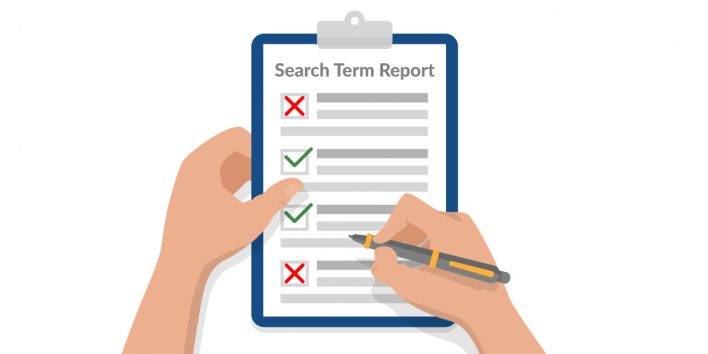Please Google, can I have my search terms back?
So, the search terms report within Google Ads will now be showing only search terms that reach a higher volume.
- Why is Google doing this?
- Will it affect your Google Ads campaigns?
- And is there anything you can do (apart from bad mouthing Google on social media along with the rest of the PPC community)?
What are search terms?
Search terms are reported on by Google so you can see exactly what searches triggered your ads – and which keyword Google associated with this term.
The report is handy because:
- It suggests that you should go for more relevance by targeting a specific term instead of letting searches be triggered by a close match.(e.g. have ‘farmhouse chairs’ as a keyword as it is a search term that is receiving a lot of hits but only served in your campaign by ‘rustic furniture’.)
- As you can see from the example above, Google can be pretty broad in its interpretation of a ‘broad match’. Search terms are the most effective tool at advertiser’s disposal to make sure they are not paying for unnecessary clicks.Which is to say that search terms are a great source of negative keywords (terms that will prevent your ad from showing if present in a search).
Negative keywords do two very useful things:
They help boost your clickthrough rate (and – in doing so – boost your Quality Score which will reduce your costs)
And they stop search audiences you are not interested in from clicking on your ads (which reduces your costs further).Quick example.
Cybersecurity is a super-competitive market with high cost per clicks. Within this market penetration tests are central – commonly called pen tests. Now bidding on pen tests as a term will cover counterfeit currency pens used to test notes, metallic tests sharing the name, soil tests and… you guessed it, hundreds of irrelevant searches.
And, pretty much all that stands between you and a twenty quid a pop click for nothing are search terms.
In a nutshell: advertisers rely on the search term report to optimise their paid search performance.
But, a big chunk of it is about to be pulled from under our feet.
Why?
What is Google doing to search terms and why on earth is it doing it?
Google nonchalantly broke the news at the bottom of a support page – a tactic usually referred to as ‘burying bad news’.
On the first day in September 2020 it said:
‘Starting September 2020, the search terms report only includes terms that a significant number of users searched for, even if a term received a click. You may now see fewer terms in your report.’
Now, it could be argued that low-volume, irrelevant keywords aren’t important.
But, just as it is with long-tail keywords, each one may amount to little but taken together they make up the vast bulk of searches.
Here’s how many see this change:
- It has been linked to loss of control over keyword match types among other recent changes that reduce visibility and ability to control costs from Google.
- The crude interpretation of this is that it is just the Big G out to ‘do evil’ and make more money.
- The slightly more nuanced version sees it as Google attempting to force the change from directly managed campaigns and move advertisers to its preferred model of auto bids, auto ads, and keyword-less bidding.
Google insists it is something different altogether.
- The change has been announced as another way that Google is protecting the privacy of users. Searches with a low volume could risk disclosing the identity of a user.
It’s worth pointing out here that a broad match for downright lie is not exactly convincing.
And personally, I’m not exactly convinced.
What can you do now search terms are restricted?
- Carry on using what search terms are available.
- Augment Google’s reports with those from Bing – there’s a lot you can transfer from one platform to another.
- Test Dynamic Search Ads as a way to discover new keywords – these will target using machine learning based on your landing page with no need for a keyword list. The search terms for these will help you find new keywords for other campaigns.
- Smart bidding options (such as enhanced CPC or target CPA) should help you find ‘hidden’ search terms even if you are not aware of them.
It looks like – by hook or by crook – Google will be gradually migrating us all to its auto options.
But at least a spurious aspect of our online privacy will be protected.
